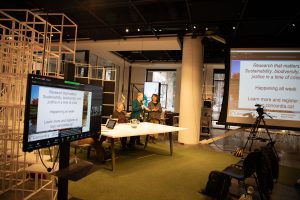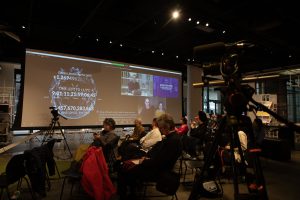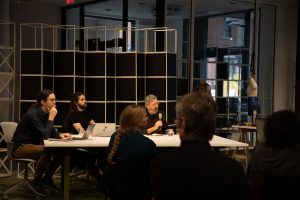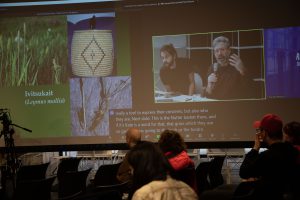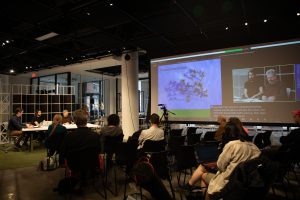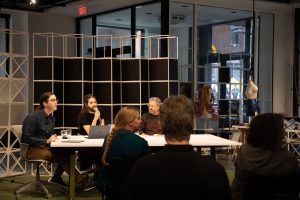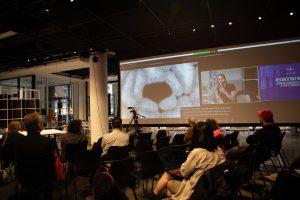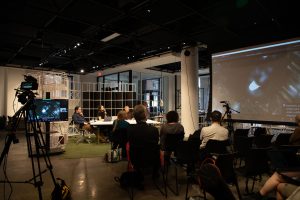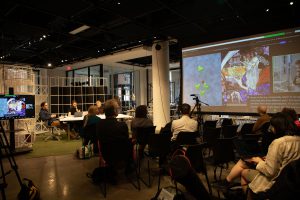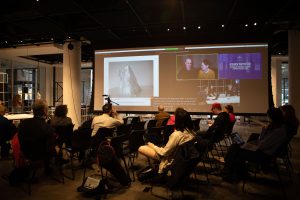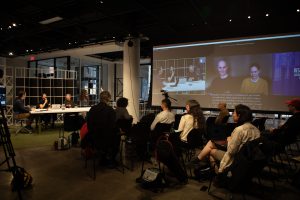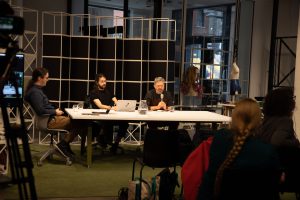
- This event has passed.
Climate Change Across Disciplines
March 13, 2023 @ 2:00 pm – 4:00 pm EDT
Climate Change Across Disciplines will focus on current research exploration by world renowned scientists joined by artists, and emerging scholars. Key researchers will present on related topics: climate change’s implications for forest ecosystems (Damon Matthews, Concordia); Indigenous expressions and connection with land (Alain Cuerrier, U of Montreal/MBG); duo Sonya Stoeva and Dimo Ivanov (Concordia MFA alumni) coming with the results of their artistic research on motion, nature, and light, and McGill’s 1st Redpath Museum Climate Change resident Milton Riaño presenting his research project. (U of Montréal alumni).
A second part of this panel, focusing on Climate Change and the Forest (Real, Imaginary and Virtual), will take place on June 13, 2023 with Suzanne Simard participating in the conversation with her research, The Mother Tree Project, highlighting the importance of forest ecosystems and the underground communication of trees; British Columbia’s colonial past, forest laws, policies and aboriginal rights with Yves Mayrand (retired lawyer-legal researcher); art-making with research combining the environmental sciences with Kathleen Vaughan (Concordia) on the St Lawrence River, Gisèle Trudel (UQÀM) on the effect of climate change on soils and forests; Leigh Joseph/Styawat (PhD, UVic) on Indigenous expressions and connection with land, along with student research-creation projects, Shelley Ouellet (MFA Concordia alumni) with twenty-one sculptural tents titled, To Build a Nation, making an inquiry around “Canadian” identity.
- Moderator: Damon Matthews (Concordia)
- Alain Cuerrier (U de Montréal/Montreal Botanical Gardens)
- Sonya Stoeva & Dimo Ivanov (MFA Concordia alumni)
- Milton Riaño (McGill’s climate change artist in residence)
Watch the recorded panel:
Bios and talk descriptions:
Damon Matthews (Professor, Department of Geography Planning and Environment, Concordia University) is Tier 1 Concordia University Research Chair in Climate Science and Sustainability. His research is aimed at better understanding the many possible interactions between human activities, natural ecosystems and future climate change. Matthews’ research contributes to the development of sound national and international climate change policy. As co-creator of the Climate Clock, Matthews will continue to develop this project in collaboration with the PI and other team members.
Talk Description
Climate change and its implications for forest ecosystems Climate change and forest ecosystems interact in important ways. Climate change could have a profound effect on forest ecosystems, leading to potential changes in ecosystem composition and function. Forests also affect climate change by sequestering carbon dioxide, offering a potential contribution to climate mitigation options. In this talk I will outline the scientific understanding of how climate changes could affect forest ecosystems, as well as the role that forests can play in decreasing the global consequences of our carbon dioxide and other greenhouse gas emissions.
Alain Cuerrier Researcher at the Montreal Botanical Garden and writer, Dr. Alain Cuerrier earned his PhD in plant systematics (University of Montreal with one year at Harvard University) before switching to ethnobotany in 2001. He participated in the creation of the First-Nations Garden in Montreal as well as in Laquenexy (France). Since then, he has started ethnobotanical and ethno-ecological projects with the Inuit, Innu, Naskapi, Cree, Squamish people of Canada as well as Palikur (French Guiana) and Cabécar (Costa Rica). As a member of the Canadian Institute Health Research Team in Aboriginal Antidiabetic Medicines, he has been active in traditional medicine since 2003. Alain Cuerrier is a member of the Plant Biology Research Institute and adjunct professor at University of Montreal. He has been vice-president of the Natural Health Product Research Society of Canada from 2010-2013 and was president of the International Society of Ethnobiology (2014-2016). Dr. Alain Cuerrier has published more than 12 books on plant uses by First Nations and Inuit of Canada as well as on the philosophy of biology.
Talk Description
Arts as an Indigenous expression of self-determination, health, and knowledge sharing Indigenous People have used arts and crafts in their daily lives. Drum, dancing, basket, carving, etc. are still important. They now also turn themselves to poetry, paintings, happenings, and other modern art avenues. These are expressions of who they were, are and will be. Through artistic pathways, Indigenous People are experiencing health through connecting the past with modern time. Braiding basket starts by reaching out to the land and land is a large part of their healing system. It is also a way to reach out to family and ancestors who are teachers and knowledge holders. Indeed, baskets are trees or herbaceous plants and knowledge. They also are teachers: teaching about sharing, about identity, and the path to who we are, about health for the berries that they hold, medicinal plants, and through harvesting. Indigenous people arts and crafts are rich, complex, and open a window to learn about reciprocity with other beings (plants, animals, minerals).
Sonya Stoeva & Dimo Ivanov (MFA alumni, Concordia University). The collaborative work of Dimo Ivanov and Sonya Stoeva took shape in 2010 as the duo IvanovStoeva following projects in Canada and Europe. In 2022, they completed a Studio Arts MFA in Intermedia (Video, Performance and Electronic Arts) at Concordia University. Dimo Ivanov received a fellowship in Leadership in Environmental and Digital Innovation for Sustainability (LEADS). Their research has received the support of several scholarships and bursaries: Canada Council, CALQ, Ville de Montréal, FRQSC- Master’s research scholarship (2019-2020) and Hexagram Network research and creation grant. They have exhibited in galleries and art centres in Chicoutimi, Montreal, Quebec, Toronto, Paris and Sofia as well as in art festivals, such as the Elektra International Digital Art Festival and the Art Souterrain Contemporary Art Festival.
Talk Description
Through our research we examine the potential and limits of technology in the process of emotional archiving. Rooted in the determination to preserve and document different natural systems, we are experimenting with animatronic mechanics that offer the possibility of simulating reality. By the use of animatronic models and 3D simulations, we examine movement, light and sound, how they transform human’s perception regarding nature and how this informs us about its state. These studies help to better understand the emotional charge that the natural environment carries on in order to translate it into our artistic creations. Based on illusion we create kinetic events which evokes nature’s fragility underlined by the transience of our installations. It is from the modulation of light and meteorological phenomena that we seek to imagine universes inspired by nature.
Milton Riaño is a Colombian new media artist with a background in engineering and geography. His works are an exploration of the role of new media technologies in our perception of time and space. Riaño creates live performances and interactive installations that integrate light, sound, sensors, programming, animation, video and real-time data processing. He has performed and exhibited his work in Colombia and Canada. Riaño holds a bachelor degree in Civil Engineering, a Specialization in Spatial Analysis from the National University of Colombia, and a Specialization in Fine Arts + Creative Technologies from the University of Montreal. Riaño was the first recipient of the Climate Change Artist-in Residence program by the Redpath Museum + Adaptable Earth Observation System + Sustainability Projects Fund at McGill University.
Talk Description
In We are all here now, Riaño will be presenting the results of his residency as the first Climate Change Artist-in-Residence at the Redpath Museum at McGill University, in which Riaño focused on the use of new media art as a creative catalyst to engage the community and enhance the visibility of climate research at McGill through collaboration with climate researchers and hosting of public workshops. The residency culminated in 2022 with a creative-research project on duckweed, a small free-floating plant with an exceptional ability to understand its surroundings. The project is currently exhibited as an installation at the Redpath Museum and includes a kinetic sculpture, interactive animations and innovative ways to integrate and explore climate data from multiple sources.
Marjorie Beaucage is a Two-Spirit Metis Auntie, filmmaker, art-ivist and educator, a land protector and a water protector. Born in Vassar, Manitoba, to a large Metis family, Marjorie’s life’s work has been about creating social change, working to give people the tools for creating possibilities and right relations. Whether in the classroom, community, campsite or the arts, Marjorie’s goal has been to pass on the stories, knowledge and skills that will make a difference for the future. For Marjorie, story is medicine. As a Two-Spirit Metis Elder, Marjorie Beacage takes on the tough topics that need to be discussed. Her work is focused on giving voice to, and creating safe cultural spaces for, traditionally silenced or excluded groups. Marjorie Beaucage is known on the local, regional and national levels as an Elder who speaks truth to power, and who holds space for difference
Talk Description
as long as the rivers flow… In the Summer 2021, Marjorie Beaucage is doing a 1900 km Water Walk to protect the Saskatchewan River, starting at the headwaters (Saskatchewan Crossing) near the Columbia Icefields in the Rocky Mountains to Lake Winnipeg. Her presentation addresses that it is written in the treaties…. yet many of our waters are in danger and many communities do not have drinking water. Walks to protect the water are what women have been doing for many years. In summer 2021, I am walking for the Saskatchewan River and documenting my journey. Water is Life and I want to share her voice. She has been a Grandmother for Walking With Our Sisters; the Elder for OUT Saskatoon; and the Elder-In-Residence for the University of Saskatchewan Student Union. She has also been called on for national research initiatives that focus on Indigenous women living with HIV, Indigenous Harm Reduction, Indigenous youth who experience sexual and gender-based violence, and post-traumatic stress. In all of these, Marjorie returns to story as medicine, to art as medicine. Marjorie says of her work, “creation is a powerful thing; whether you’re making a baby or a loaf of bread or a movie, it comes from the same place. To get people to tap into that energy that creates possibilities, so they don’t get stuck in this craziness that we’re in, is transformative.”
© 2024 Elastic Spaces
Theme by Anders Noren — Up ↑

